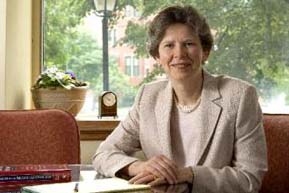BUMC and BMC Win NIH Clinical and Translational Award
$23 million will help speed research to treatments

A team of clinicians and researchers at the Boston University Medical Campus and Boston Medical Center has won a $23 million, five-year Clinical and Translational Science Award (CTSA) from the National Institutes of Health. The award, one of 14 given in 2008 to health CTSA consortium centers in 11 states, is part of an effort by the NIH’s National Center for Research Resources to reduce the time it takes for laboratory discoveries to become treatments for patients and to engage communities in clinical research efforts.
This year’s awards, together with 12 CTSAs awarded in 2007, and 12 awarded in 2006, form the core of an NIH effort to build a national consortium of select centers that will transform the way clinical and translational research is conducted. The new BU center, the Boston University Clinical and Translational Science (BU-BRIDGE) Institute, will integrate, connect, and expand research and programs across traditional academic departments and schools.
“Our program is a confirmation of the close collaboration among the three Boston University Medical Campus schools, Boston Medical Center, the Boston HealthNet Health Centers, and Boston University’s Charles River Campus,” says Karen Antman, dean of the School of Medicine and provost of the Medical Campus.
The CTSA will allow the institute to build on existing strengths to create an environment linking faculty, trainees, and University programs to speed the translation of innovations in medical science, to improve diagnosis and treatment of diseases, and to share these innovations with other university-based clinical and translational science institutes. The BU-BRIDGE environment will also help open the lines of communication between the clinical and the research communities, bringing ideas that begin in health-care clinics to the BU scientific community and back to identify new ways to improve delivery of health-care services.
The institute will also significantly enhance existing partnerships with Boston’s community health centers, bringing community-based perspectives and needs into the areas of clinical and translational research.
“With more than half of NIH’s funding allocated for basic research, the CTSA consortium is perfectly poised to help move discoveries in the laboratory to improved patient care,” says Elias A. Zerhouni, NIH director. “The consortium serves as the bridge in this process that allows researchers to perfect and refine existing treatments through interdisciplinary teams that extend to the clinic and community. Through the consortium, we are better able to leverage expertise and resources across the CTSA institutions, and ultimately maximize NIH’s investment in basic research, which should remain a top priority.”
The Medical Campus and BMC have a long history of engagement with the surrounding community, including serving as Boston’s safety-net health-care provider through the Boston HealthNet, a partnership with Boston’s community health centers. This long-standing relationship includes providing health care, training physicians and dentists, and conducting community-based clinical and translational research.
“The BU-BRIDGE Institute will build on a strong foundation of relationships and trust that presently exists,” says David Center, associate provost for translational research and the Gordon and Ruth Snider Professor of Pulmonary Medicine at the School of Medicine. “We expect the institute and its community engagement function to have a transformative effect on clinical and translational research at BUMC by infusing community-based needs and perspectives throughout the institute’s work.”
In addition to Center, the CTSA team includes Howard Bauchner, a MED professor; William Adams, a MED associate professor; Christine Chaisson, director of the SPH data coordinating center; Janice Kopp, administrative manager of the MED General Clinical Research Center; Deborah Fournier, an SDM assistant professor and associate dean; Raul Garcia, an SDM professor and chairman of health policy; Howard Cabral, an SPH associate professor at; George O’Connor, a MEd professor; David Felson, a MED professor; Robert Friedman, a MED professor; Richard Saitz, associate director of the BUMC Office of Clinical Research and associate director of the Clinical Research Training Program; Wendy Mariner, an SPH professor and a LAW propfessor; David Seldin, a MED professor; and Avrum Spira, a MED assistant professor.
Participating institutions and community partners include Boston University, Boston Medical Center, the Veterans Administration, the Boston Healthcare System, the Framingham Heart Study, Boston HealthNet, the National Emerging Infectious Diseases Laboratories, the Northeast Center for Research to Evaluate and Eliminate Dental Disparities, and the Partners in Health and Housing Prevention Research Center.
Comments & Discussion
Boston University moderates comments to facilitate an informed, substantive, civil conversation. Abusive, profane, self-promotional, misleading, incoherent or off-topic comments will be rejected. Moderators are staffed during regular business hours (EST) and can only accept comments written in English. Statistics or facts must include a citation or a link to the citation.